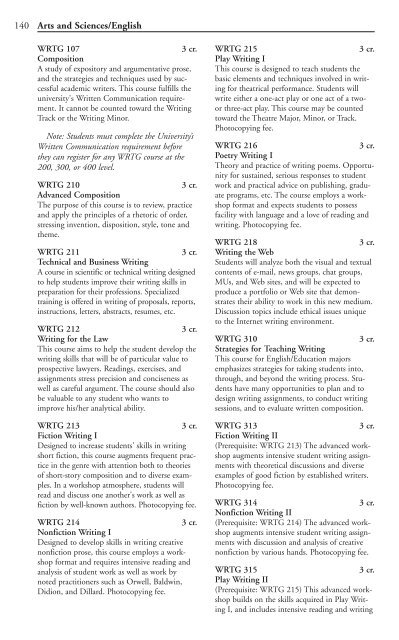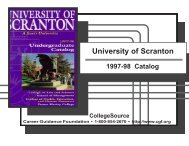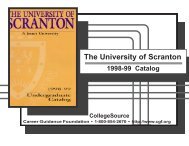2003-2004 - The University of Scranton
2003-2004 - The University of Scranton
2003-2004 - The University of Scranton
You also want an ePaper? Increase the reach of your titles
YUMPU automatically turns print PDFs into web optimized ePapers that Google loves.
140 Arts and Sciences/English<br />
WRTG 107 3 cr.<br />
Composition<br />
A study <strong>of</strong> expository and argumentative prose,<br />
and the strategies and techniques used by successful<br />
academic writers. This course fulfills the<br />
university's Written Communication requirement.<br />
It cannot be counted toward the Writing<br />
Track or the Writing Minor.<br />
Note: Students must complete the <strong>University</strong>’s<br />
Written Communication requirement before<br />
they can register for any WRTG course at the<br />
200, 300, or 400 level.<br />
WRTG 210 3 cr.<br />
Advanced Composition<br />
<strong>The</strong> purpose <strong>of</strong> this course is to review, practice<br />
and apply the principles <strong>of</strong> a rhetoric <strong>of</strong> order,<br />
stressing invention, disposition, style, tone and<br />
theme.<br />
WRTG 211 3 cr.<br />
Technical and Business Writing<br />
A course in scientific or technical writing designed<br />
to help students improve their writing skills in<br />
preparation for their pr<strong>of</strong>essions. Specialized<br />
training is <strong>of</strong>fered in writing <strong>of</strong> proposals, reports,<br />
instructions, letters, abstracts, resumes, etc.<br />
WRTG 212 3 cr.<br />
Writing for the Law<br />
This course aims to help the student develop the<br />
writing skills that will be <strong>of</strong> particular value to<br />
prospective lawyers. Readings, exercises, and<br />
assignments stress precision and conciseness as<br />
well as careful argument. <strong>The</strong> course should also<br />
be valuable to any student who wants to<br />
improve his/her analytical ability.<br />
WRTG 213 3 cr.<br />
Fiction Writing I<br />
Designed to increase students' skills in writing<br />
short fiction, this course augments frequent practice<br />
in the genre with attention both to theories<br />
<strong>of</strong> short-story composition and to diverse examples.<br />
In a workshop atmosphere, students will<br />
read and discuss one another's work as well as<br />
fiction by well-known authors. Photocopying fee.<br />
WRTG 214 3 cr.<br />
Nonfiction Writing I<br />
Designed to develop skills in writing creative<br />
nonfiction prose, this course employs a workshop<br />
format and requires intensive reading and<br />
analysis <strong>of</strong> student work as well as work by<br />
noted practitioners such as Orwell, Baldwin,<br />
Didion, and Dillard. Photocopying fee.<br />
WRTG 215 3 cr.<br />
Play Writing I<br />
This course is designed to teach students the<br />
basic elements and techniques involved in writing<br />
for theatrical performance. Students will<br />
write either a one-act play or one act <strong>of</strong> a twoor<br />
three-act play. This course may be counted<br />
toward the <strong>The</strong>atre Major, Minor, or Track.<br />
Photocopying fee.<br />
WRTG 216 3 cr.<br />
Poetry Writing I<br />
<strong>The</strong>ory and practice <strong>of</strong> writing poems. Opportunity<br />
for sustained, serious responses to student<br />
work and practical advice on publishing, graduate<br />
programs, etc. <strong>The</strong> course employs a workshop<br />
format and expects students to possess<br />
facility with language and a love <strong>of</strong> reading and<br />
writing. Photocopying fee.<br />
WRTG 218 3 cr.<br />
Writing the Web<br />
Students will analyze both the visual and textual<br />
contents <strong>of</strong> e-mail, news groups, chat groups,<br />
MUs, and Web sites, and will be expected to<br />
produce a portfolio or Web site that demonstrates<br />
their ability to work in this new medium.<br />
Discussion topics include ethical issues unique<br />
to the Internet writing environment.<br />
WRTG 310 3 cr.<br />
Strategies for Teaching Writing<br />
This course for English/Education majors<br />
emphasizes strategies for taking students into,<br />
through, and beyond the writing process. Students<br />
have many opportunities to plan and to<br />
design writing assignments, to conduct writing<br />
sessions, and to evaluate written composition.<br />
WRTG 313 3 cr.<br />
Fiction Writing II<br />
(Prerequisite: WRTG 213) <strong>The</strong> advanced workshop<br />
augments intensive student writing assignments<br />
with theoretical discussions and diverse<br />
examples <strong>of</strong> good fiction by established writers.<br />
Photocopying fee.<br />
WRTG 314 3 cr.<br />
Nonfiction Writing II<br />
(Prerequisite: WRTG 214) <strong>The</strong> advanced workshop<br />
augments intensive student writing assignments<br />
with discussion and analysis <strong>of</strong> creative<br />
nonfiction by various hands. Photocopying fee.<br />
WRTG 315 3 cr.<br />
Play Writing II<br />
(Prerequisite: WRTG 215) This advanced workshop<br />
builds on the skills acquired in Play Writing<br />
I, and includes intensive reading and writing
















